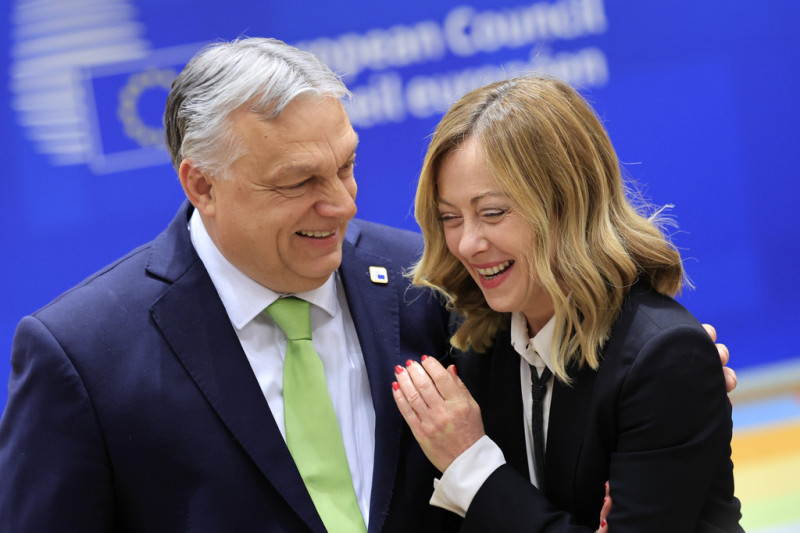In less than a decade, he has gone from “ultranationalist puppet” to being the figure Brussels, and now Washington, can work with
The Italian Prime Minister Giorgia Meloni is highlighted as the most powerful political personality in Europe for 2025 by Politico. As he characteristically states, in less than a decade, the leader of the right-wing party Brothers of Italy has transformed from a “supernationalist puppet” to the prime minister of Italy and a figure with whom Brussels, and now Washington, can cooperate, despite her often far-right views.
“Who do you call if you want to talk in Europe?”
If you’re Elon Musk — the world’s richest man and a key adviser to United States President-elect Donald Trump — the number you’re dialing belongs to Georgia Meloni,” the article reads.
Since her election in 2022, the Italian prime minister has introduced controversial policies on issues such as immigration and LGBTQ rights that would once have been condemned by Brussels.
In contrast, the reaction of European Union leaders ranged from indifference to approval, with many accepting Meloni as “the delightful representative of the increasingly radical couple that is flourishing on both sides of the Atlantic”.
“I’m the bitch, Melony”
Meloni made headlines around the world when she became Italy’s first female prime minister, but few predicted she would stay in power for long because of internal rifts within her ruling coalition.
Moreover, “after years of putting up with the antics of Hungarian President Viktor Orbán”, top EU officials were not thrilled with the arrival of yet another leader who had campaigned on “God, country and family” and formed a government with parties they liked Russian President Vladimir Putin.
But over the past two years, Meloni has established her government as one of the most stable in post-war Italy. Although the country has a national debt equivalent to 137% of its GDP, the economic forecast is not so dire as to scare off foreign investors, who are attracted by the unusually calm political environment.
Additionally, Meloni’s carefully cultivated, serious, no-nonsense appearance contributes to the image of stability she cultivates.
When the president of the Campania region, Vincenzo De Luca, called the prime minister a “stronza” (“bitch”) at a campaign rally, Mleoni appeared at an event in his region and greeted the opposition politician coldly and with icy tone saying, “President de Luca, I’m the bitch, Meloni. What are you doing?’
After the video of February in which Vincenzo De Luca said “lavora tu, stronza”, referring to Giorgia Meloni, the latter has saluted the president of Campania pic.twitter.com/LCYcwJwzJc
— Trash Italian (@trash_italiano) May 28, 2024
As Politico comments, Meloni shows the image of a prime minister who, despite the fact that she is petite, manages to prevail over her opponents.
“It is clear that the appearance of dominance is not just superficial. No member of her coalition dares to mount an internal challenge to her authority, and the hopelessly fractured opposition openly admits that they cannot defeat her,” the article reads.
Willing partners
European leaders, instead of decrying the erosion of civil liberties in Italy, turn a blind eye to the situation as an “internal matter”.
Their stance has a simple explanation: At the same time that the right-wing politician has consolidated its dominance at home, it has also worked hard to convince the bloc’s top leaders that it is a reliable partner, supporting them on key issues that they are interested in – mainly immigration.
Working with Commission President Ursula von der Leyen, Meloni oversaw landmark deals with Tunisia, Mauritania and Egypt that pump billions of euros into repressive regimes that keep migrants out of Europe by intercepting their boats , locking them in prisons or throwing them into the desert.
Most recently, she launched a bold plan to outsource the detention of undocumented immigrants to Albania – regardless of whether her plan was thwarted by the Justice in Italy.
Of course, this did not prevent European leaders from expressing their admiration for the “Meloni model”.
EU heads of government telegraphed their interest in the Italian prime minister’s approach at their meeting last October, where they agreed that “new ways of preventing and tackling irregular migration should be considered”.
Von der Leyen got the message and now plans to present a draft directive on “returns” as soon as February.
Source :Skai
With a wealth of experience honed over 4+ years in journalism, I bring a seasoned voice to the world of news. Currently, I work as a freelance writer and editor, always seeking new opportunities to tell compelling stories in the field of world news.











